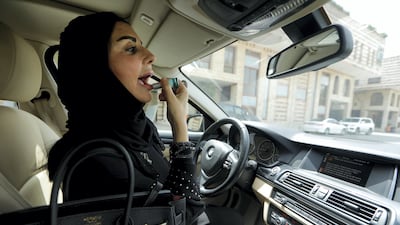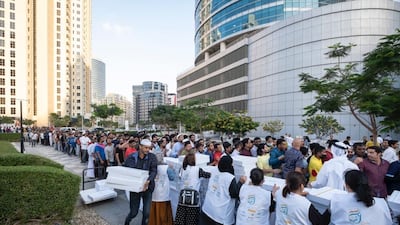Fasting during Ramadan is an act of worship and obligatory for all healthy Muslims who have reached puberty.
However, there are valid exemptions.
Hussein Al Ahdal, Grand Mufti at Dubai's Islamic Affairs and Charitable Activities Department, says people who break a Ramadan fast with a valid exemption can simply make up for it by fasting before the next holy month, or offer appropriate redemption if fasting is not possible.
Many believe that inhaling dust, using insulin injections or going to a doctor for an important appointment can invalidate their fast.
Here, Grand Mufti Al Ahdal provides clarity on what may or may not invalidate fasting during Ramadan.
What are the rules?
There are two categories of actions that can break a fast during Ramadan.
“The first category of the act refers to ingesting something, such as eating, drinking, taking medicine or vitamin injections,” Grand Mufti Al Ahdal said.
“The second category refers to acts such as sexual intimacy, menstruation, vomiting, using ear drops, eye drops and nose drops.
“Whatever makes its way into the human abdomen leads to a breaking of the fast. Muslims need to know that while fasting.”
Drinking or eating accidentally
Grand Mufti Al Ahdal says that if a person unintentionally eats or drinks while fasting then his or her fast is still valid.
“God is the most merciful. When a person accidentally eats or drinks, it doesn’t break their fast,” he said.
“If the person simply tastes food, but doesn’t swallow it and rinses it away, it won’t break the fast. He should rinse the mouth and nose with only a limited quantity of water, to avoid swallowing the water. But swallowing the water will invalidate the fast.”
Smoking or chewing gum
Chewing gum or smoking breaks the fast during Ramadan. Nicotine patches will not.
Illness and taking injection
There are exceptions for people who suffer from an illness and need immediate medication.
“Giving blood for a test, taking intravenous or muscular injections and taking insulin injections is permitted when fasting,” Grand Mufti Al Ahdal said.
But taking a nutritional injection nullifies the fast.
If a person suffers from any type of illness, then he or she is excused from fasting.
Brushing teeth
Grand Mufti Al Ahdal said that brushing teeth using toothpaste and a brush is discouraged because the paste can reach the throat. If it does not reach the throat, it does not break the fast.
“It is better to use a miswak [a teeth-cleaning twig] because it is preferable to be used during the fasting hours to brush teeth and eliminate bad breath,” he said.
Inhaling dust and perfumes
Being exposed to dust on the road, or using an inhaler, perfumes or nicotine patches, does not invalidate the fast.
Burning bukhoor or incense and then inhaling it intentionally invalidates the fast but a small whiff does not.
Bathing or swimming
Bathing or swimming does not break the fast but if the water makes its way through the mouth into the throat or inside the nose, it is likely to reach the stomach, which may nullify the fast.
“Any water that reaches the throat will invalidate the fast,” Grand Mufti Al Ahdal said.
Intimacy during Ramadan
This is not permitted during fasting hours. The penalty is fasting for two consecutive months or feeding 60 poor people.
Using lipstick, cream and nail polish
Using lipstick or any cream on the skin, or applying make-up, does not break the fast.
But nail polish must be removed ahead of ablution before prayers. The nail paint does not allow water to touch the nails and ablution will not be considered to have been done the right way.
For more information, people can speak with a mufti at IACAD by calling 800600, or call the UAE Council for Fatwa on 8002422.









